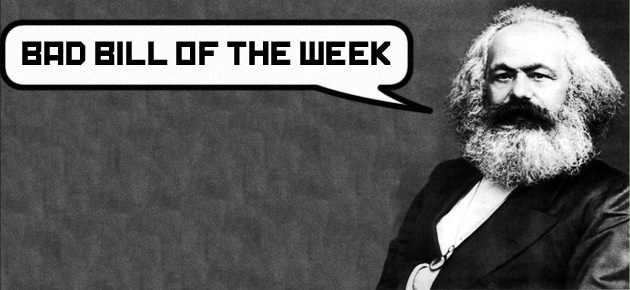Publisher's note: This post, by Brian Balfour, was originally published in the Bad Bill of the Week section(s) of Civitas's online edition.
One of the ten planks of
Karl Marx's Communist Manifesto is "Centralization of credit in the hands of the State." Apparently of like mind is North Carolina state Senator
Ellie Kinnaird (D-Orange), primary sponsor of
Senate Bill 150, Study State-Owned Banks.

Basically, the "state-owned bank" would take taxpayer dollars, then loan these funds to select businesses (including privately owned banks). You don't think there'd be any political preferences to who receives these loans, do you? And what interest rates would the state-owned bank charge - would they reflect the riskiness of the loans and the
market's rate of time preference?
Moreover, the bill states that "excess earnings" of the bank could be "used to supplement General Fund purposes." But what if the bank loses money? By definition a state-owned bank would primarily be lending to investments deemed unworthy by private lending institutions, meaning the state-owned bank's loan portfolio would be especially high-risk. Is there any doubt North Carolina taxpayers would be forced to bail it out? Have we learned nothing about the dangers of the system of socialized risk from Fannie Mae and Freddie Mac?
Worse still is this: Kinnaird's bill represents another shift of power from individuals to the political class. By establishing a state-owned bank, decisions over creditworthy business investments would be centralized to a purely political organization, rather than left in the hands of private citizens. In a free society, however, the use of scarce resources and means of production is dictated by consumers - based according to their purchasing decisions. Capital goods, land, labor and other resources are directed toward satisfying the most urgent needs of consumers.
Under a state-owned bank, unaccountable political appointees will determine which investments are funded, and in turn determine the use of the means of production. Scarce resources are used not in response to the needs of the masses, but rather according to the whims of the political class. More power is taken from the many and concentrated in the hands of the few.
Because it takes a page out of the Karl Marx playbook, and would further erode freedom by politicizing more of our economy, SB 150 is this week's Bad Bill of the Week.
Posted on May 24, 2013 by Brian Balfour in Bad Bill of the Week
One of the ten planks of Karl Marx's Communist Manifesto is "Centralization of credit in the hands of the State." Apparently of like mind is North Carolina state Senator Ellie Kinnaird (D-Orange), primary sponsor of Senate Bill 150, Study State-Owned Banks.
Basically, the "state-owned bank" would take taxpayer dollars, then loan these funds to select businesses (including privately owned banks). You don't think there'd be any political preferences to who receives these loans, do you? And what interest rates would the state-owned bank charge - would they reflect the riskiness of the loans and the market's rate of time preference?
Moreover, the bill states that "excess earnings" of the bank could be "used to supplement General Fund purposes." But what if the bank loses money? By definition a state-owned bank would primarily be lending to investments deemed unworthy by private lending institutions, meaning the state-owned bank's loan portfolio would be especially high-risk. Is there any doubt North Carolina taxpayers would be forced to bail it out? Have we learned nothing about the dangers of the system of socialized risk from Fannie Mae and Freddie Mac?
Worse still is this: Kinnaird's bill represents another shift of power from individuals to the political class. By establishing a state-owned bank, decisions over creditworthy business investments would be centralized to a purely political organization, rather than left in the hands of private citizens. In a free society, however, the use of scarce resources and means of production is dictated by consumers - based according to their purchasing decisions. Capital goods, land, labor and other resources are directed toward satisfying the most urgent needs of consumers.
Under a state-owned bank, unaccountable political appointees will determine which investments are funded, and in turn determine the use of the means of production. Scarce resources are used not in response to the needs of the masses, but rather according to the whims of the political class. More power is taken from the many and concentrated in the hands of the few.
Because it takes a page out of the Karl Marx playbook, and would further erode freedom by politicizing more of our economy, SB 150 is this week's Bad Bill of the Week.


























